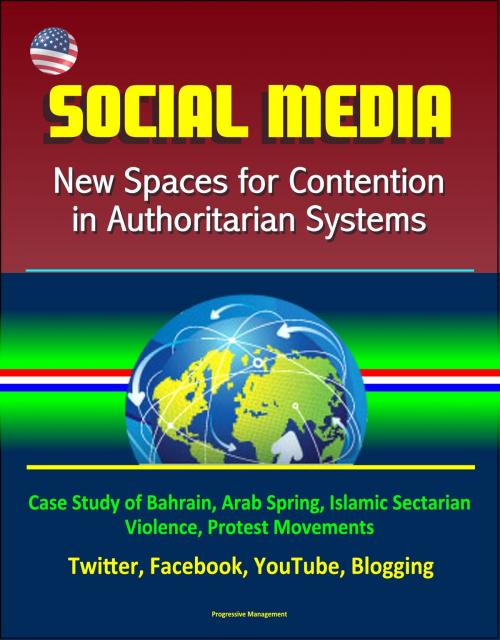Social Media: New Spaces for Contention in Authoritarian Systems - Case Study of Bahrain, Arab Spring, Islamic Sectarian Violence, Protest Movements, Twitter, Facebook, YouTube, Blogging
Nonfiction, History, Middle East, Computers, Internet| Author: | Progressive Management | ISBN: | 9781370940073 |
| Publisher: | Progressive Management | Publication: | November 30, 2016 |
| Imprint: | Smashwords Edition | Language: | English |
| Author: | Progressive Management |
| ISBN: | 9781370940073 |
| Publisher: | Progressive Management |
| Publication: | November 30, 2016 |
| Imprint: | Smashwords Edition |
| Language: | English |
This excellent report has been professionally converted for accurate flowing-text e-book format reproduction. What role has social media played in Bahraini political movements since 2011? Does it facilitate and encourage a space for free expressions of ideas, or do the dominant groups utilize social media to promote their agendas and shape social unrest outcomes? This study examines how the use of social media altered the course of protests in Bahrain on the heels of the regional Arab Spring movement. Historical protest activities incorporated the free space social media offered to offset the effects of government control and intimidation. This change resulted in a level of prolonged protests and violence never before seen in the country, where the momentum for change hung in the balance between protesters and an authoritarian regime. Social media played a role not only in organization and mobilization of the protests but also in the shaping of international opinion of the growing conflict. In the end, government and protesters alike used social media to further their agendas and minimize the effects of the others.
CHAPTER I - SOCIAL MEDIA: NEW SPACES FOR CONTENTION IN AUTHORITARIAN SYSTEMS * A. BACKGROUND * B. MAJOR RESEARCH QUESTIONS * C. SIGNIFICANCE OF THE RESEARCH QUESTION * D. LITERATURE REVIEW * 1. Historical and Political Setting * 2. Social Media Use to Augment Protest Movements * 3. Social Media Activism into Real-World Application * E. POTENTIAL EXPLANATIONS AND HYPOTHESES * F. RESEARCH DESIGN * CHAPTER II - AN AUTHORITARIAN STATE AND ITS HISTORY OF PROTEST * A. A DIVIDED COUNTRY * B. HISTORY AND THE CONFLICT * C. PROTEST AND CRIES FOR CHANGE * D. IMPACT OF COLONIALISM * E. NAVIGATING EXTERNAL SECURITY NEEDS AND DOMESTIC STRIFE * F. SOCIAL AND POLITICAL STRUCTURE * 1. Discrimination * 2. Group Cohesion * 3. Use of Violence * 4. External Support * 5. International Economic Status * G. TRIGGERS FOR PROTEST * H. GOVERNMENT ACTIONS * I. PREPARING FOR CHANGE * CHAPTER III - SOCIAL MEDIA: POWER TO THE PEOPLE - 2011-2013 * A. FREE SPACES * B. TRADITIONAL VIEW OF PROTESTS * C. INITIAL ORGANIZATION EFFORTS AND GOVERNMENT RESPONSES * 1. Protesters * 2. Government * a. Security Forces * b. Political Response * 3. Media Considerations * D. OUTCOMES OF INITIAL PROTESTS * E. SECONDARY EFFECTS OF SOCIAL MEDIA AFTER INITIAL PROTESTS * 1. Protesters * 2. Government Reactions * F. END OF THE RISE OF THE PROTESTERS * CHAPTER IV - REPRESSION AND FATIGUE: 2013-2015 * A. OPPOSITION * 1. Youth Movements * 2. Al Wefaq * 3. Organizational Changes * 4. Protest, Violence and the Media * B. GOVERNMENT * 1. Security Organization * 2. Political Dialogue * 3. The Continued Media Battle * C. OUTCOMES * 1. Political Opportunities * 2. Separation and Divisions * 3. The Role of Social Media as the New Free Space * CHAPTER V - CONCLUSION * A. SUMMARY OF RESEARCH * B. FINDINGS * 1. Research Questions * 2. Hypotheses * C. IMPLICATIONS OF RESEARCH * D. CONCLUSION *
This excellent report has been professionally converted for accurate flowing-text e-book format reproduction. What role has social media played in Bahraini political movements since 2011? Does it facilitate and encourage a space for free expressions of ideas, or do the dominant groups utilize social media to promote their agendas and shape social unrest outcomes? This study examines how the use of social media altered the course of protests in Bahrain on the heels of the regional Arab Spring movement. Historical protest activities incorporated the free space social media offered to offset the effects of government control and intimidation. This change resulted in a level of prolonged protests and violence never before seen in the country, where the momentum for change hung in the balance between protesters and an authoritarian regime. Social media played a role not only in organization and mobilization of the protests but also in the shaping of international opinion of the growing conflict. In the end, government and protesters alike used social media to further their agendas and minimize the effects of the others.
CHAPTER I - SOCIAL MEDIA: NEW SPACES FOR CONTENTION IN AUTHORITARIAN SYSTEMS * A. BACKGROUND * B. MAJOR RESEARCH QUESTIONS * C. SIGNIFICANCE OF THE RESEARCH QUESTION * D. LITERATURE REVIEW * 1. Historical and Political Setting * 2. Social Media Use to Augment Protest Movements * 3. Social Media Activism into Real-World Application * E. POTENTIAL EXPLANATIONS AND HYPOTHESES * F. RESEARCH DESIGN * CHAPTER II - AN AUTHORITARIAN STATE AND ITS HISTORY OF PROTEST * A. A DIVIDED COUNTRY * B. HISTORY AND THE CONFLICT * C. PROTEST AND CRIES FOR CHANGE * D. IMPACT OF COLONIALISM * E. NAVIGATING EXTERNAL SECURITY NEEDS AND DOMESTIC STRIFE * F. SOCIAL AND POLITICAL STRUCTURE * 1. Discrimination * 2. Group Cohesion * 3. Use of Violence * 4. External Support * 5. International Economic Status * G. TRIGGERS FOR PROTEST * H. GOVERNMENT ACTIONS * I. PREPARING FOR CHANGE * CHAPTER III - SOCIAL MEDIA: POWER TO THE PEOPLE - 2011-2013 * A. FREE SPACES * B. TRADITIONAL VIEW OF PROTESTS * C. INITIAL ORGANIZATION EFFORTS AND GOVERNMENT RESPONSES * 1. Protesters * 2. Government * a. Security Forces * b. Political Response * 3. Media Considerations * D. OUTCOMES OF INITIAL PROTESTS * E. SECONDARY EFFECTS OF SOCIAL MEDIA AFTER INITIAL PROTESTS * 1. Protesters * 2. Government Reactions * F. END OF THE RISE OF THE PROTESTERS * CHAPTER IV - REPRESSION AND FATIGUE: 2013-2015 * A. OPPOSITION * 1. Youth Movements * 2. Al Wefaq * 3. Organizational Changes * 4. Protest, Violence and the Media * B. GOVERNMENT * 1. Security Organization * 2. Political Dialogue * 3. The Continued Media Battle * C. OUTCOMES * 1. Political Opportunities * 2. Separation and Divisions * 3. The Role of Social Media as the New Free Space * CHAPTER V - CONCLUSION * A. SUMMARY OF RESEARCH * B. FINDINGS * 1. Research Questions * 2. Hypotheses * C. IMPLICATIONS OF RESEARCH * D. CONCLUSION *















